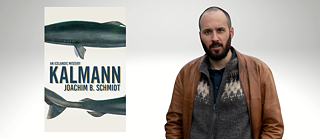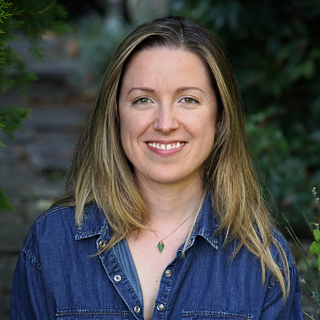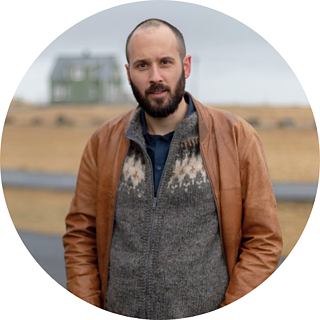Joachim B. Schmidt
Kalmann

In the delightfully crowded field of Nordic noir, this crime thriller set in Iceland commands a unique place. Afterall, what more perfect setting could there be for crime fiction than deserted snow deserts tainted by wine-red blood from murder? The sparse landscape - populated by mysterious characters where myths abound - is where Swiss-Icelandic writer Joachim B. Schmidt successfully tapped into the genre. His book Kalmann is as much a whodunnit as it is a character study of its eponymous protagonist, a socially awkward man navigating a murder mystery in the hostile countryside.
By Prathap Nair
Originally written in German and translated by Jamie Lee Searle with its sharply observed prose, the book won the Glauser-Preis 2024 in Germany for its portrayal of a neuro-divergent lead character. With Kalmann being commissioned to be a TV series, the sequel of the book - Kalmann and the Sleeping Mountain - is currently being translated. In this interview, Schmidt tells us more about the book.
Give us a little background on what prompted your move to Reykjavík and write a German-language Icelandic crime thriller.
I fell in love with Iceland on my first trip at the age of 15. Upon return to Switzerland, where I grew up, I felt heartbroken. In the following years, I did return to Iceland a few times, staying longer each time, spending a whole year in 2003 to finally make the decision of immigrating to Iceland in 2007. Already during my first year in Iceland, I felt the extreme urge to write, not just because I had a lot of time on my hands – I was working and living on a remote farm – but also because I felt the need to tell stories. That´s where I wrote my first novel that however didn´t get published. But I realised that I needed to write stories since Iceland had such an inspiring effect on me. Now, after 18 years in Iceland, I am fully integrated into Icelandic society - I have Icelandic citizenship, and I am married with kids, but I keep writing my stories in my mother tongue German. Icelandic is an old, therefore extremely complicated, language. I wouldn´t dare to write in it.
In the Nordic noir genre, Reykjavik murder mysteries are a genre of their own. Icelandic writers like Arnaldur Indridason and Ragnar Jónasson have been hugely successful in English translation. What has been your interest in the genre and who has been your inspiration?
Starting out, my first three novels didn´t get much attention. That´s when I set out to write an Icelandic crime novel, seeing how Arnaldur, Ragnar and Yrsa had some best sellers. However, as soon as I started writing my first crime novel, I realized that the crime itself wasn’t what interested me as much as the people in the story - such as the “town idiot”, named Kalmann, the person who happened to stumble upon a crime scene. I believed that he was the true protagonist of the story - not an idiot but just underestimated. He is a wise and complex character navigating through a mean and, at times, violent world in northern Iceland. Kalmann helped me write a book that is more than just a crime novel; a study of a young man with a cognitive disability within a tightly-knit society in a remote fishing village.
You were a journalist before you became a fiction writer. How much of your journalism experience did you draw upon for the book (especially in portraying the marginalised immigrant communities)?
I love researching and meeting people that I wouldn’t otherwise meet, if not for research purposes. I’m intrigued by fiction that is deeply rooted in reality and have a strong affinity for outsiders and their stories. Kalmann gave me the opportunity to stick my nose into people’s homes and tell their stories. It is, in fact, a continuation of what I did as a journalist when I was writing about volcanic eruptions and bank crashes.
A few landscapes, and to some extent, the characters and bizarre events in your book are somehow reminiscent of the new season of the American television series True Detective. Did you also seek inspiration from books or TV shows while writing Kalmann?
I draw inspiration from good movies and good books, often unconsciously. But I would be lying if said that “Fargo” or “Forrest Gump” did not inspire me to write Kalmann. Also, thank you for equating the TV series True Detective to Kalmann. It makes me very proud, also because an Icelandic production company has started developing a TV-project based on the book!
With the new book “Kalmann und der schlafende Berg”, it seems you have already turned Kalmann into a series. Are there more books coming out?
Yes, the English translation of the sequel Kalmann and the Sleeping Mountain will be out this summer, and the plan is to make it a trilogy. With the third book, I wish to squeeze in a non-crime novel between every crime novel – as I have been doing so far. It´s good not to rush into things too (in terms of writing more books in the Kalmann series. Besides, Kalmann needs some rest).
Does your reading include English language books? Are you familiar with Indian literature? If so, let us know some of your favourites.
For most of my life I have been obsessed with Icelandic literature, now even more since I can read it in Icelandic: Jón Kalman Stefánsson, Hallgrímur Helgasón, Gunnar Gunnarsson, Steinunn Sigurðardóttir, Einar Kársson, Sjón... I´m ashamed to say that I am not familiar with Indian literature. However, I thought I had read Indian literature – only to realize that I had been ignorant. I remember having read “Monsun oder Der weisse Tiger” as a teenager. The book is about a young boy from Bombay struggling with poverty, ending up on the street in Chennai and learning the trade of a snake charmer. It was written by Klaus Kordon, a German writer. Also, I thought for a long time that the wonderful book “Life of Pi” was written by a Canadian writer with Indian roots. Oh, I was wrong again.

When Bitter Lemon Press bought the rights to Kalmann’s sequel, I couldn’t wait to spend more time with its quirky and loveable hero. I've never had so much fun translating a book, and, starting on Kalmann and the Sleeping Mountain, I already had the feeling of familiarity with the narrator’s voice, ensuring that the process really flowed. I strove to preserve the texture (linguistically) in Kalmann’s thought processes; his neurodiversity is celebrated, and the humour that zings through the text is always directed at the rest of the world, highlighting how Kalmann’s perspective often makes more sense than the common worldview.
Joachim’s love for Iceland, his adopted home, really shines through in the prose and gives the setting a captivating vibrancy. One of the reasons why translation keeps me coming back for more is that I learn so much through it; with Kalmann, I’ve discovered so much about Icelandic culture (not least hákarl, a fermented shark dish featured in the book).
For me, the driving force in literary translation has always been about bringing a diversity of voices and experiences to new readers. It’s a craft that carries great responsibility, and I’m always honoured to be trusted by writers like Joachim. I hope he’ll carry on writing Kalmann books, so I can spend quality time with "the sheriff" for many years to come.
About the Author
